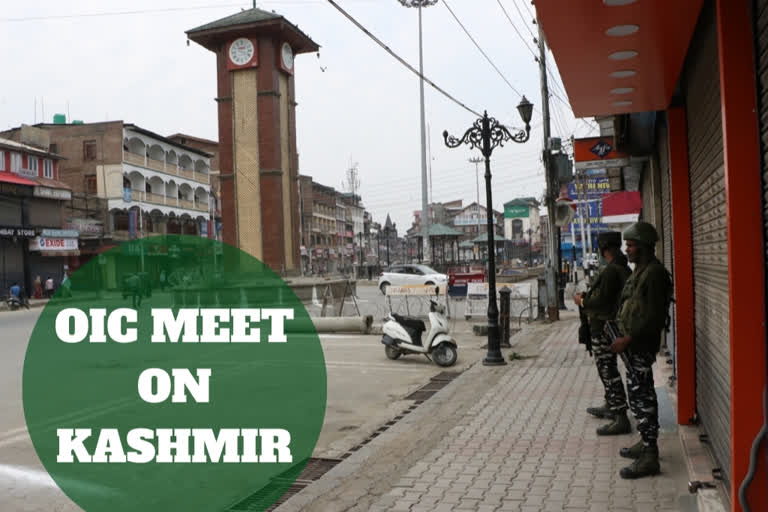New Delhi: Saudi Arabia – the current Secretary General of the Organization of Islamic Countries (OIC) - is reported to have accepted Pakistan's suggestion to convene a meeting of the OIC to discuss the situation in Kashmir. There is no official announcement as yet on the venue, dates or level of participation though the possibility of the OIC meeting being held in Islamabad in April 2020 has been mentioned in a segment of Indian media.
The Saudi decision was apparently conveyed by Saudi Arabia’s Foreign Minister to his Pakistani counterpart during a meeting in Islamabad on December 26, 2019.
According to Pakistan Foreign Office statement, the two Foreign Ministers had discussed “OIC role in the advancement of the cause of Kashmir” after the Pak Foreign Minister had “dilated in detail on the situation in Indian Occupied Jammu and Kashmir in the aftermath of the unilateral and illegal actions of 5th August (an implied reference to abrogation of Article 370 etc)” The Pak Foreign Minister also cited the Citizenship Amendment Act and National Register of Citizens to accuse India of “systematic targeting of minorities in India, particularly Muslims."
Pakistan's obsession with Kashmir is an open secret. However, Saudi Arabia’s decision comes against a particular backdrop which is reflected in the sequence of recent developments as elaborated and discussed below.
India's decision in August 2019 to abrogate Article 370 of its Constitution and thus end the special status of the State of Jammu and Kashmir, and also to bifurcate it into two Union Territories was received in Pakistan as God-sent opportunity to malign India with its false narrative. It is a well-known fact that Pakistan misses no opportunity to internationalise the Kashmir issue, while reiterating from time to time its “political, diplomatic, and moral support for Kashmiris in their freedom struggle."
Read: Pakistan claims OIC to hold 'special meet' on Kashmir
Pak PM Imran Khan, therefore, went to UNGA in the following month of September with great hopes of mobilizing anti-India opinion. However, he was visibly disappointed by his own admission (to reporters in New York) over the lack of response from the international community to his efforts to bring international pressure on India. Malaysia and Turkey were the only two notable Islamic countries which endorsed Pakistan's viewpoint on Kashmir. PM Khan attributed the lack of response to "one billion market" in India, conveniently ignoring the fact that the outcome was a result of deft diplomacy by India, who has made significant inroads in recent years into Islamic countries including the giants such as Saudi Arabia and UAE.
The fall out of the failure, including on the part of the Muslim countries, to pin down India over Kashmir was a trilateral meeting between the leaders of Pakistan, Turkey and Malaysia in New York at which it was decided inter-alia to launch an Islamic TV and also hold an Islamic Summit to address the major issues confronting Islam globally.
Malaysia agreed to host the Islamic Summit. Besides several others, some prominent non-Arab Muslim countries such as Pakistan, Turkey, Malaysia, Iran etc. and also Qatar agreed to attend. It is relevant to mention that while Turkey, Iran and Malaysia are rivals of Saudi Arabia, the latter along with UAE and others had severed all links with Qatar in June 2017. The KL Islamic Summit was viewed in Saudi Arabia as an attempt to challenge its leadership of global Islamic community and also to raise an organisation parallel to OIC and thus not only weaken the Organization but also Islam.
Read: No need to give credence to OIC says former envoy Anil Trigunayat
The Saudis could not prevent the Islamic Summit which was eventually held in Kuala Lumpur in mid-December, 2019 but managed to put pressure on Pakistan to wriggle out of the Summit at the eleventh hour. Pakistan had reasons to succumb to Saudi pressure as financial assistance from Saudi Arabia and remittances from more than seven hundred thousand Pakistani workers employed in Saudi Arabia are much needed for its sagging economy. As a quid pro quo, Saudi Arabia agreed to Pakistan's suggestion to discuss the situation in Kashmir in OIC partly to reward Pakistan and partly to prevent the erosion of OIC 's credibility and its own position in the Islamic world. In the process Kashmir for no good reasons finds itself caught in the turf war for leadership of global Islam.
Will Saudi Arabia's decision impact the relations between the two strategic partners - India and Saudi Arabia? It would depend largely on how India chooses to react.
Kashmir issue has often been discussed at OIC and its deliberations/ resolutions on Kashmir in the past proved out to be inconsequential and had no impact on India’s Kashmir policy or more importantly on global opinion on Kashmir.
In my opinion, though India would be well justified in conveying its displeasure, but realpolitik should discourage India from making an issue of it as it would not be advisable to jeopardise its strategic partnership with Saudi Arabia over an issue in which Saudi Arabia’s decision is linked to intra-Islamic politics rather than to any intention to act against India’s sensitivities.
Read: India slams OIC for references to J-K in its Makkah summit declaration



